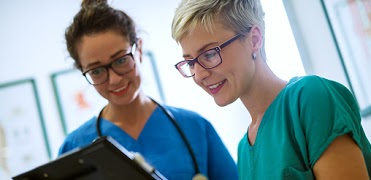Join our Community
Innovation Mini-Grants
RISE is funding two $5,000 Innovation Mini-Grants for faculty, staff, and learners at Michigan Medicine who are interested in promoting innovation in medical and/or graduate education with the potential to advance science, health, and healthcare delivery.
The RISE Fellowship is an 18-month fellowship aimed at promoting translational education within Michigan Medicine. RISE Fellows receive 0.25 effort and up to $7,500 to develop and implement a translational education project. Fellows also receive coaching and participate in our newly designed development program to learn about innovation strategies, translational education and pedagogical principles.
RISE focuses on educational practices and interventions that strive to improve health. The strategic priorities identified during the pilot phase of RISE include ideas that will address one or more of the following strategic priorities:
1. facilitate learner creativity and scientific problem-solving;
2. support transitions along the continuum (e.g., pre-candidate to candidate; medical school to residency, etc.)
3. coordinate learning systems and clinical/scientific data across the continuum
4. address key health issues currently facing society, such as:
- Health care access (including costs, delivery, or disparities)
- High-prevalence health conditions (including obesity, mental health, & chronic pain)
- Preventative health care (including vaccinations & ecological issues)
As part of this funding, recipients will be required to complete an assessment of your innovation competency, participate in our monthly RISE community activities (approximately 2 hours/month October 2019-March 2021), participate in cohort sessions, and receive feedback on their innovation at an annual RISE Innovation Symposium. Recipients will also identify a mentor and other key individuals to be part of their innovation team. Individuals receiving mini-grant funds will also work with a coach to develop and implement their education innovation project as well as participate in our monthly RISE Community Activities.
Important Dates & How to Apply
How to Apply:
Applications will be submitted on the RISE website [hyper link]. As part of the application process, you will be asked to upload the following documents.
- Resume or curriculum vitae
- A proposal describing your education innovation that details: (3-page limit)
- What existing major health problem/need will you address?
- How will your education project address this problem/need?
- What potential barriers and challenges do you anticipate?
- How do you propose to measure the success of your proposed innovation (both early, ongoing, and end state)?
- Who will you recruit to join your team? It is strongly recommended that the team include a learner.
- An itemized budget that details how you propose to use the proposed innovation funds (up to $5,000)
- A letter of support from your supervisor, director, division or department chair, addressed to Dr. Rajesh Mangrulkar, that addresses their support for your participation in Community of Practice and the alignment of the initiative with your career development.
Important Dates:
- Application Submission Deadline: July 26, 2019 at 11:59pm
- Interviews: August 19, 2019 from 1:00 pm – 5:00 pm (NOTE: if invited to interview, you will be assigned to a specific 45-minute block of time)
- Notification of Decision: late August 2019
- Funding Begins: October 2019
ADDITIONAL RESOURCES:
Connect with RISE
 RISE Fellowships
RISE Fellowships
RISE is sponsoring an 18-month Fellowship that will provide support for those who wish to develop and implement novel ideas in education, and also develop themselves as innovators. All faculty at the University of Michigan Medical School are eligible.
The RISE Fellowship is an 18-month fellowship aimed at promoting translational education within Michigan Medicine. RISE Fellows receive 0.25 effort and up to $7,500 to develop and implement a translational education project. Fellows also receive coaching and participate in our newly designed development program to learn about innovation strategies, translational education and pedagogical principles.
Translational Education Project: RISE focuses on translational medical education, which means using education practices and interventions by (T1) transferring knowledge, skills, attitudes, and other attributes from the education environment into the clinical setting to (T2) improve health care practices, and (T3) impacting health outcomes. Each Fellow must submit a description of a translational medical education project that will address an existing major health problem. Fellows will be expected to develop and implement their education project.
RISE invites ALL ideas for medical or graduate education innovation that have the potential to advance science, health, and healthcare delivery. RISE is interested in supporting innovative ideas and projects in education that have the potential to transform the way we learn and train. Based on extensive input from our community, Initial priorities during this pilot phase include ideas that will:
1. facilitate learner creativity and scientific problem-solving;
2. support transitions along the continuum (e.g., pre-candidate to candidate; medical school to residency, etc.)
3. coordinate learning systems and clinical/scientific data across the continuum
4. address key health issues currently facing society, such as:
- Health care access (including costs, delivery, or disparities)
- High-prevalence health conditions (including obesity, mental health, & chronic pain)
- Preventative health care (including vaccinations & ecological issues)
Support: Fellows will receive 0.25 FTE for 18 months and a maximum award of $7,500 to assist in the completion of their project. As part of the 0.25 FTE, the Fellow will be required to participate in our innovation development program (approximately 2 hours/week October 2019-March 2021), cohort sessions, and receive feedback on the project at the annual RISE Innovation Symposium in May 2020. Fellows will identify a mentor and other key individuals to be part of their project team. They will also be paired with an innovation coach to help facilitate their project.
Important Dates & How to Apply
Important Dates:
- RISE Fellowship Informational Webinar: March 20, 2019, 4:00 – 5:00 pm
https://bluejeans.com/572240093 - RISE Fellowship Brainstorming Session: March 26, 2019, 1:00-2:00 PM, 3817 Medical Sciences Building II
- Application Submission Deadline: April 19, 2019 at 11:59pm
- Interviews: May 13 from 8am-3pm and May 15 from 9am-12pm (NOTE: if invited to interview, you will assigned to a specific 1.5 hour block of time)
- Notification of Decision: late-May/early June, 2019
- RISE Fellowship Begins: October 2019
How to Apply:
As part of the application process, you will be asked to upload the following documents.
- Resume or Curriculum Vitae
- A brief proposal on your translational medical education project that details (5-page maximum):
- What existing major health problem/need will you address?
- How will your education project address this problem/need?
- What potential barriers and challenges do you anticipate experiencing?
- How do you propose to measure the success of your project (both early, ongoing, and end state)?
- Who will you recruit to join your team? If the applicant is not a learner, it is strongly recommended that the team include a learner.
- Budget that describes how you propose to use the project funds (up to $7,500)
- A letter of support from your supervisor, Division or Department chair, addressed to Dr. Rajesh Mangrulkar, that addresses their support for your participation in the fellowship with an explicit agreement for effort/release time and the alignment of the fellowship with your career development.
ADDITIONAL RESOURCES:
RISE Fellowship Project Proposal – Idea Development Rubric (PDF)
 Community of Practice
Community of Practice
Our Innovation Community of Practice will support collaboration through shared ideas, resources, and goals. This community will be diverse and inclusive—representing learners, staff, faculty, and innovators across the Michigan Medicine continuum from different disciplines, organizations, and expertise. This collaborative community will implement ideas to address important educational problems, share best practices, foster professional development, and ultimately drive innovation throughout all of medical education. Join our community to receive email communications. We will provide quarterly updates on our progress as well as send invitations to upcoming events.